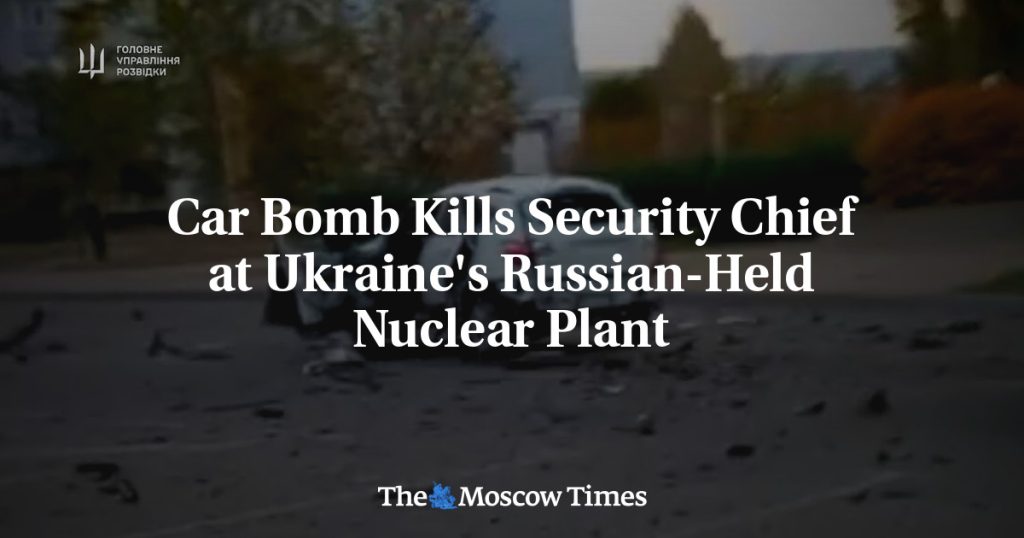The head of security at the Zaporizhzhia nuclear power plant in southern Ukraine, controlled by Russia, was killed in a car bombing. Andriy Korotkiy was inside his vehicle when it was hit by an explosion in the Russian-occupied city of Enerhodar. The surveillance video of the incident showed the white SUV being ripped apart by a powerful blast. The authenticity of the video could not be independently verified. Russia’s Investigative Committee launched a criminal murder case over the incident, stating that the victim died from injuries in the hospital. Ukraine’s HUR military intelligence agency accused Korotkiy of defecting to the Russian authorities and assisting in “war crimes and repressions against Ukrainians under occupation.”
Following Russia’s full-scale invasion of Ukraine in February 2022, Russia seized control of the Zaporizhzhia nuclear plant, which is the largest in Europe. The UN’s nuclear safety agency IAEA has called for restraint as both sides accuse each other of attacks on the plant that could result in a major nuclear accident. Ukraine’s HUR claimed that Korotkiy had shared personal data of pro-Ukrainian colleagues with the Russian authorities and organized events in support of Russian forces. He was also a member of Enerhodar’s Moscow-installed municipal council from the pro-Kremlin United Russia party. Ukrainian military intelligence warned that every war criminal would face fair retribution.
The incident at the Zaporizhzhia nuclear power plant highlights the ongoing tensions and violence in the region following Russia’s invasion of Ukraine. The killing of the head of security, Andriy Korotkiy, in a car bombing has further escalated the situation. The blurry surveillance video showing the white SUV being ripped apart by the blast has raised concerns about the safety and security of the plant. With accusations of war crimes and repressions against Ukrainians under occupation, the conflict continues to intensify. The involvement of the UN’s nuclear safety agency IAEA emphasizes the potential risks of attacks on the plant that could lead to a major nuclear accident.
The murder of Andriy Korotkiy at the Zaporizhzhia nuclear power plant has sparked investigations by both Ukrainian and Russian authorities. Russia’s Investigative Committee has launched a criminal murder case over the incident, while Ukraine’s HUR military intelligence agency has accused Korotkiy of defecting and aiding in war crimes against Ukrainians under occupation. The situation has further strained the already tense relations between the two countries following Russia’s invasion of Ukraine. The warning issued by Ukrainian military intelligence about retribution for war criminals underscores the seriousness of the situation and the determination to hold those responsible accountable for their actions.
The seizure of the Zaporizhzhia nuclear power plant by Russia and the subsequent killing of the head of security, Andriy Korotkiy, have raised concerns about the safety of the largest nuclear plant in Europe. The involvement of the UN’s nuclear safety agency IAEA reflects the international community’s concern about the potential risks associated with attacks on the plant. The mutual accusations of attacks on the plant highlight the volatile situation in the region and the need for restraint to prevent a major nuclear accident. The conflict between Russia and Ukraine has further intensified with accusations of war crimes and repressions, adding to the already high tensions in the region.
The killing of Andriy Korotkiy in a car bombing at the Zaporizhzhia nuclear power plant represents a significant escalation of violence in the region. The blurry surveillance video showing the aftermath of the explosion has added to the uncertainty surrounding the incident. With both Ukrainian and Russian authorities launching investigations into the murder, the situation remains fluid and highly volatile. The accusations of defection and collaboration with the Russian authorities have further inflamed tensions between the two countries. The warning of retribution for war criminals issued by Ukrainian military intelligence underscores the gravity of the situation and the determination to hold those responsible accountable. The ongoing conflict in the region shows no signs of abating, and the international community continues to monitor the situation closely to prevent a major catastrophe.


